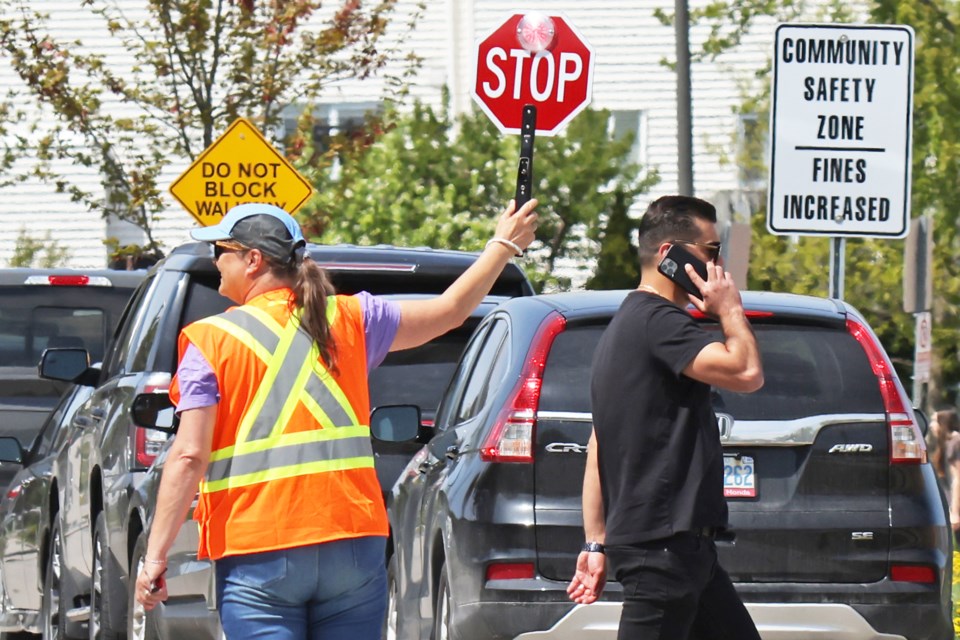City councillors have backtracked on plans for an adult school crossing guard program.
Sitting in general committee Wednesday, councillors sent the matter to the city’s community safety committee.
Although city staff did not recommend it, councillors had a plan before them for crossing guards at nine Barrie school locations, which would cost $350,000 to $400,000 annually, and take 12 months to staff and launch for the start of the 2025 school year.
Instead, Coun. Bryn Hamilton introduced a $300,000 plan with financial contributions from the city, school boards and parent councils, and which each school would have to apply for, starting in September, but it was sent to committee.
“It needs some further investigation and fleshing out, but there does seem to be a desire to look at a more collaborative and equitable approach,” Hamilton said.
Barrie resident Tannis McCarthy, a Simcoe Muskoka Catholic District School Board high school teacher, has pushed Barrie councillors for the program.
But there is no consensus among councillors about what plans there should be for an adult crossing guard program, how it should be funded or even the the source of the funding.
No funding would be available from the public or separate schools boards, according to city staff, should council decide to implement the adult crossing guard program.
But several councillor said there should be.
“We’ve had the answer from the school board,” said Mayor Alex Nuttall. “I think the only way that they get involved is by us approving something, essentially public shaming them into being involved. And I’m not sure that works.”
“I don’t think the city will solve this issue with a single hand,” said Coun. Nigussie Nigussie. “Somehow the school board should be part of this program. I know they say no.”
“I would really like to see the school board itself play a big role in this,” said Coun. Clare Riepma.
“As far as pressuring the school board to chip into this, I think we should absolutely be knocking on their door to buy in for this,” said Coun. Amy Courser.
Hamilton’s motion also suggested funding could come from the automated speed enforcement (ASE, or speed cameras) program, which McCarthy has also suggested, noting that data collected from ASE proves that speeding in Barrie’s school zones is common.
But Michael Prowse, the city’s chief administrative officer, threw up a caution flag on that idea.
“I think staff have grave concerns about over-committing revenues from the speed-camera program,” he said. “We expect the speed-camera program to work, which means that people will slow down and our revenues will diminish, not increase.”
Councillors approved a motion Wednesday that the city lease two more speed cameras, giving Barrie four instead of two speed-camera zones, since each location requires one camera.
Courser said she was concerned about the ability of different schools to raise money for an adult crossing guard program.
“We’ve got parent councils that are fundraising for rolls of paper towels for the classrooms and supplies,” she said. “There are certain schools that just don’t have the money. They get left out of this program because they can’t raise the money to opt into it?”
For the nine-school model, city staff collected data at 112 locations in the vicinity of elementary schools in the fall of 2023 and analyzed it to create a baseline of what’s called warrant criteria. Locations counted consisted of all-way stop controls, minor stop controls, signalized intersections, pedestrian crossovers and designated school crossings.
In total, 6,102 students were counted crossing public roadways, ranging from junior kindergarten up to Grade 8. After the studies were analyzed, nine locations were determined to be candidates for an adult school crossing guard program.
The city also did a review of collisions involving vehicles and pedestrians, aged four to 14, Monday to Friday, 7 a.m. to 5 p.m.
There were 16 collisions January 2013 to December 2016, 12 collisions January 2017 to December 2019, and four collisions January 2020 to the present, although that last number was affected by the pandemic.
None of these collisions occurred at any of the nine locations identified for adult crossing guards.
Barrie police also reviewed the collision data from city staff and it's consistent with their collision data.
City staff say that, from a safety perspective, there are several alternatives to adult crossing guards, such as automated speed enforcement, limiting vehicle access and physical alterations to the road structure.
City legal staff say they are not aware of any legislative requirement for a municipality to have and operate an adult crossing guard program.
Liability matters could arise, however, if a municipality establishes a crossing guard program and is negligent in implementing it, such as having issues hiring adult crossing guards.
Ontario’s Highway Traffic Act defines school crossing guards as persons 16 years of age or older who direct the movement of people across a highway and who are employed by a municipality or employed by a corporation under contract with a municipality, to provide school crossing guard services.
The school crossing guard’s role is to direct and supervise the movement of people across a public roadway by creating necessary gaps in vehicle traffic to provide safe passage at a designated school location.






